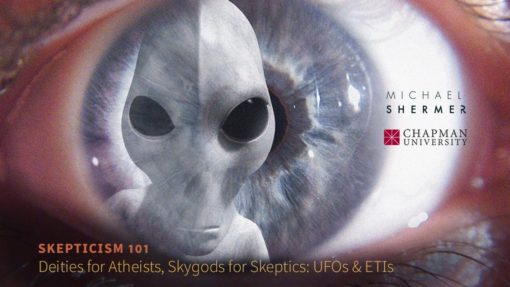SETI

Shermer and Powell discuss: • technosignatures and biosignatures • convergent vs. contingent evolution • SETI science vs. UFO/UAP science • Are they out there? Have they come here? • what alien intelligence might be like (biological, digital, or otherwise) • Bayesian reasoning about UFOs and UAPs • the U.S. military UAP videos and what they represent • The Disclosure Project from the U.S. government • Projects Sign, Blue Book, Cyclops, Grudge • AATIP (Advanced Aerospace Threat Identification Program) • directionality…

Shermer and Graff discuss: national security • how long government secrets can be kept • cultural context for UFO sightings • why David Grusch’s testimony could be accurate but still not represent alien contact • Kenneth Arnold • Roswell • The Fermi Paradox • why 90-95% of all UFO sightings are explainable • anomalies and how to treat them • Avi Loeb (Galileo Project) • President Clinton’s investigation into UFOs • UFOs as a modern myth or religion.

Despite much ballyhoo in the media, all efforts thus far have failed to provide substantive evidence that might link the appearance of UFOs, now called UAPs (unidentified aerial phenomena), with aliens from other planets. This failure results from limitations imposed by both biology and distance. As Morton Tavel explains, when these factors are combined, they render any such contacts virtually impossible.

Author, journalist and TV personality Nick Pope ran the British government’s UFO program for the Ministry of Defense, leading the media to call him the real Fox Mulder. He’s recognized as one of the world’s leading experts on UFOs, the unexplained, and conspiracy theories. Nick is the media’s go-to person for UFOs.
Read the Skeptic Research Center’s general report, “Pandemic Politics: How 2020 Impacted Americans’ Social and Political Attitudes,” based on their nine reports from the Civil Unrest and Presidential Election Study (CUPES) released in late 2020–early 2021. PLUS: Michael Shermer speaks with author, journalist, and TV personality Nick Pope about UAPs, UFOs, conspiracies, and cover-ups.

For all of neuroscience’s advances, we’ve made little progress on its biggest question: How do simple cells in the brain create intelligence? Jeff Hawkins and his team discovered that the brain uses maplike structures to build a model of the world — not just one model, but hundreds of thousands of models of everything we know. This discovery allows Hawkins to answer important questions about how we perceive the world.

In The Michael Shermer Show # 169, Michael Shermer speaks with Jeff Hawkins, cofounder of Numenta: a neuroscience research company, about his new book A Thousand Brains: A New Theory of Intelligence. PLUS: Raymond Barglow and Margret Schaefer discuss the anti-vaccination movement in the age of COVID-19.

Shermer and Loeb discuss: anomalies in science and astronomy in particular • Galileo and Saturn • Signal Detection Theory • face on Mars • Is Oumuamua ETI in origin? • Intelligent Design • Carl Sagan and SETI • Law of Very Large Numbers • How many unknown knowns could account for Oumuamua? • Kip Thorne • gravitational waves • multiverse theory, and more…
In episode 157 of The Michael Shermer Show, Dr. Shermer speaks with Avi Loeb about his new book Extraterrestrial: The First Sign of Intelligent Life Beyond Earth which outlines his controversial theory and its profound implications for science, religion, and the future of our species and our planet.

Dr. Michael Shermer distinguishes between two questions: (1) Are extraterrestrial intelligences (ETIs) out there somewhere in the cosmos? and (2) Have aliens come here? Evidence for both questions is considered in the larger context of why the issue so compels us to answer it almost religiously.
Dr. Michael Shermer distinguishes between two questions: (1) Are extraterrestrial intelligences (ETIs) out there somewhere in the cosmos? and (2) Have aliens come here? Evidence for both questions is considered in the larger context of why the issue so compels us to answer it almost religiously.

Exploring Earthlings’ various attempts to reach out to non-Earthlings over the centuries, Daniel Oberhaus poses some not entirely answerable questions. Is there not only a universal grammar (as Noam Chomsky has posited), but also a grammar of the universe? If we send a message into space, will extraterrestrial beings receive it? Will they understand? What languages will they (and we) speak? If we can’t even communicate with non-human mammals and primates, how are we going to communicate with sentient alien…
The endlessly fascinating question of whether we are alone in the universe has always been accompanied by another, more complicated one: if there is extraterrestrial life, how would we communicate with it? In Science Salon # 88 Michael Shermer speaks with Daniel Oberhaus about his new book: Extraterrestrial Languages.
In this week’s eSkeptic: MonsterTalk: Yetipalooza Skepticality: Dream On: Interview with John Fugelsang Feature: Meeting ET: A Review of Preparing for Contact STOCK UP FOR HALLOWEENat smile.amazon.com and Amazon donates to the Skeptics Society Halloween is lurking just around the corner. Shop for your treats, costumes, and decorations at smile.amazon.com and Amazon will donate to […]

If intelligent life exists elsewhere in the universe, how should we interact, and what will it mean for our civilization? Lawrence E. Grinter reviews Preparing for Contact: When Humans and Extraterrestrials Finally Meet (2014), by George Michael.
In this week’s eSkeptic, George Michael reviews the book Civilizations Beyond Earth: Extraterrestrial Life and Society edited by Douglas A. Vakoch and Albert A. Harrison (Berghahn Books, 2011, ISBN 978-0857452115).
For nearly 50 years, the SETI (Search for Alien Intelligence) project has searched for evidence of alien civilizations and has occasionally sent messages into space with the intention of communicating with intelligent sentient extraterrestrial beings. How likely are we to come into contact with an extraterrestrial civilization? If they do exist, their aspirations could differ markedly from our own. Could visitors from extraterrestrial civilizations pose a threat to Earth? What would motivate aliens to visit the Earth? In this week’s eSkeptic, George…
In this week’s eSkeptic, Justin Trottier reviews Ray Jayawardhana’s new book Strange New Worlds: The Search for Alien Planets and Life Beyond Our Solar System.
Why do we think aliens are out there? Is Earth really being visited? Will aliens really be short, gray, and hairless? What happens if we pick up a signal from another world? These are just a few of the questions this week’s Skepticality guest tackles regularly, in his role as the senior astronomer for the SETI (Search for Extra-Terrestrial Intelligence) Institute. Dr. Seth Shostak talks with Swoopy about the ongoing search for life in the universe, as chronicled in his…
In this week’s eSkeptic, Seth Shostak responds to an article published in New Scientist magazine by Eugenie Samuel Reichthe, which suggests the SETI@home project has found strong evidence for extraterrestrial intelligence.


















